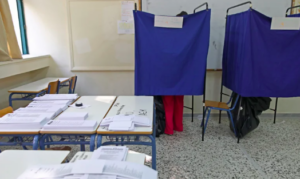Recent polls show steadfast projections in voting intentions in the June 9th European elections. New Democracy maintains a 33.1%, SYRIZA 15.4%, followed by PASOK at 12.2%.
Kyriakos Velopoulos’s party shows a drop, possibly linked to an altercation involving Floros-Grammenos hurting its polling numbers. The Communist Party of Greece (KKE) remains steady at 9%, with Victory (Niki) and Freedom’s Course (Plevsi Eleftherias) seeing an increase. The New Left (Nea Aristera) and Andreas Loverdos’ Democrates are in a battle for the 3% threshold.
Analysts note that the unpredictable factor of non-participation could significantly impact election dynamics. Organizers hope for approximately 5 million voters, however, current estimates hold around 4.6 million citizens who will participate marking a historical low turnout falling below 50%. Only Sunday official results will indicate the extent of voting disengagement and hence will confirm or refute the polls.
Kyriakos Mitsotakis: Daily living at the forefront and European elections

Thomas Gerakis, president and CEO of Marc, highlights the limitations of polls in accurately predicting non-participation for the upcoming European elections. He maintains that two objective factors could negatively impact voter turnout. Unlike previous years, this election will be the fifth in 12 months. Parties are striving for a pinnical turnout, with the government stressing the importance of these elections for Greece’s financial security. However, the opposition aims to turn the elections into an anti-government referendum. Gerakis also discusses the soft vote, which poses a threat to both New Democracy and SYRIZA due to unparalleled dynamics affecting each party’s voter base, raising uncertainty for the third position.

The challenge of predicting disengagement from these European elections complicates analysts’ understanding which parties will benefit or burden. While New Democracy’s lead is secure, uncertainty looms over second place and the 3% threshold. Surveys indicate that SYRIZA’s newcomers demonstrate little voting certainty, possibly favoring leisure over voting. Non-participation disposes support to political parties namely smaller ones. Recent data from the 2023 elections highlights a decline in turnout, affecting all parties except Victory (Niki). For about two decades voter turnout has steadily declined, with European elections commonly experiencing higher disengagement percentages. The upcoming June 9, 2024, European elections evoke previous record-low turnout viewed in 2009.
Ask me anything
Explore related questions





